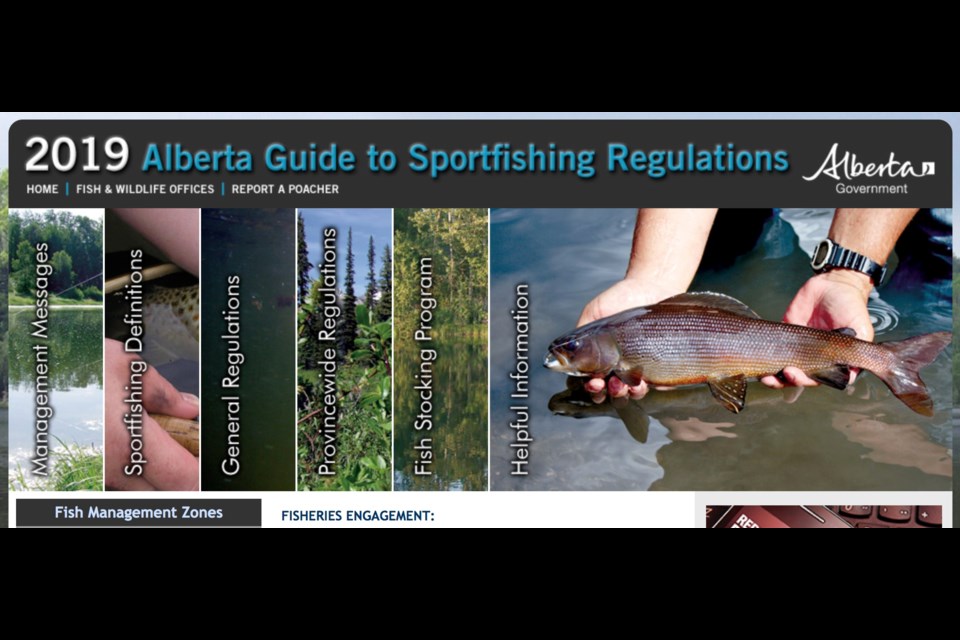Albertans are invited to take part in multiple open house sessions throughout the next couple of weeks to share their views and suggestions on how to expand fishing opportunities within the province. Lac La Biche and St Paul are two of the locations.
There will be a total of 11 open house events hosted by Alberta's Environment and Parks, that will take place starting this week. Lac La Biche County residents can attend the Tuesday, Jan. 28 meeting in the community hall at Sir Winston Churchill Provincial Park. A similar session is planned for St. Paul the night before, to connect many residents in the province's Lakeland with concerns over the area's fishing opportunities. The open house event is said to provide details on fisheries management in Alberta and make proposals on how to create more opportunities for recreational harvest within specific lakes.
RELATED: Opinion — What will the fishing guide net us?
Over the past five years, Lac La Biche County Mayor Omer Moghrabhi says the County has been proving its input to increase the number of fisheries. Still, the government has not listened and continues to close lakes to fishing, which has had a significant impact on the County and the region. Moghrabi hopes this time Albertans' voices will be heard.
Why was it restricted?
Lac La Biche lake is the seventh-largest lake in all of Alberta, covering close to 23,000 hectares with an average depth of 8.4 meters, and Moghrabi knows it used to be a huge tourist attraction, thanks to the fishing opportunities. But in 2005 governent officials began to report that top predators such as the walleye and pike were at risk of completely disappearing from the lake due to overfishing. After years of research that included electro-shocking the waters to count the stunned fish that came to the surface and studying the diet of predator bird species, government officials placed limitations on commercial and sportfishing.
By 2006 anyone fishing was only permitted to catch and release walleye from Lac La Biche lake in the hopes of increasing their population.
It's a move that has not sat well with municipal officials who say the restrictions have affected the community's tourism and economics. In the past several years, residents and municipal leaders from the Lakeland region have held community rallies and meetings to seek out answers from government officials. Some residents, like Lac La Biche Sporting Goods owner Albert Moghrabi — the Mayor's own brother — went so far as to create petitions to present to the government opposing the prolonged fishing restrictions.
One of the most active opponents of the recent fishing restrictions is a former government fisheries biologist. But he's not convinced this latest round of open house discussions will be any different than the ones that have come before.
What should be up for discussion?
In an email sent out to Minister Jason Nixon, retired biologist Ray Makowecki explains that many area anglers and members of a regional Volunteer Biologist Group are reluctant to attend due to the lack of action from the government officials in previous discussions. Makowecki, a St. Paul area resident, created a working group called the Next Step Team more than two years ago as a working group to push for answers — and solutions — to the ongoing fishing concerns of the region. But the biologists says there may not be a next step if provincial fisheries officials don't start explaining their actions.
Makowecki, the working group and regional supporters have long contested the government's findings, saying that area lakes don't have the population losses that government officials have been reporting. Last week, Makowecki provided a couple of suggestions for the upcoming meetings, the first being an increase in transparency of fish information for the public.
“I would recommend that placing such information on a government website for the public is essential in demonstrating transparency,” Makowecki noted, including a summary of the fish stocks within each lake.
In 2016 there was a concern that there was a lack of reporting on which lakes were being sampled and which fish were being caught.
“The basic data was to allow interested persons to follow the fish population trends and, in so doing, be able to better communicate with the government biologists,” he said.
Makowecki has also suggested that the government needs to understand that there are possible tools to help sustain fish without the risk of overharvesting. He suggests setting a limit on the number and size of the fish being caught, or to possibly reduce the season for anglers.
Both Makowecki and Moghrabhi are will be attending the open house events held throughout the region. They are encouraging area residents concerned with local fishing and local economies to attend.
For anyone not able to attend the series of regional meetngs, the government has created a website for online submissions. Interested anglers can submit feedback www.TalkAEP.Alberta.ca.
Input from the meetings is said to be considered in the province's 2020 Alberta Sportfishing Regulations, which come into effect April 1.
The meetings are to run from 4:30 p.m. to 8:30 p.m; at the following locations.
Monday, Jan. 13
Teresa Sargent Hall
9839 103 Avenue
Grande Prairie
Wednesday, Jan. 15
Midland Community Hall
105 20 Street NW
Drumheller
Thursday, Jan. 16
Red Deer Museum
4525 47A Avenue
Red Deer
Thursday, Jan. 16
Galloway Station and Travel Centre
223 55 Street
Edson
Monday, Jan. 20
Energy Centre Board Room
7825 51 Street
Cold Lake
Monday, Jan. 20
Lethbridge Public Library
810 5 Avenue South
Lethbridge
Tuesday, Jan. 21
Bow Habitat Station
1440 17A Street SE
Calgary
Wednesday, Jan. 22
St. Albert Inn and Suites
1556 St. Albert Trail
St. Albert
Monday, Jan. 27
St. Paul Recreation Centre
4802 53 Street
St. Paul
Tuesday, Jan. 28
Community Hall, Sir Winston Churchill Provincial Park
Lac La Biche
Friday, Jan. 31
Lou Soppit Community Centre
5404 48 Street
Rocky Mountain House
* With files from Rob McKinley / LLB POST



